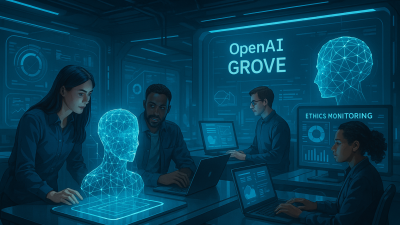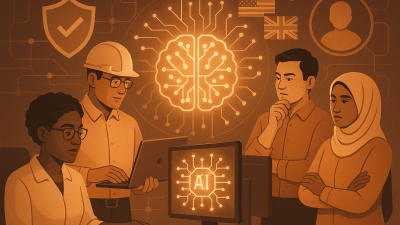Artificial Intelligence (AI) has emerged as one of the most transformative forces in the modern economy. From healthcare and finance to automotive and marketing, AI-driven solutions are reshaping industries, enhancing efficiency, and unlocking new opportunities. For professionals, understanding the career paths that have the most impact in this field is essential. Not only are these roles in high demand, but they also offer the chance to influence the direction of AI development on a global scale.
We explore two leading roles shaping the AI industry today: AI Product Managers and Machine Learning Engineers. We’ll analyze their responsibilities, the human and societal impact of their work, and the career opportunities that make them critical for the future. Additionally, we’ll discuss how you can gain the necessary skills.
AI Product Manager: The Strategist of Innovation
AI Product Managers (AI PMs) are the bridge between technical teams and business strategy. They oversee the development and deployment of AI products, ensuring that projects align with organizational goals and deliver value to users. Their responsibilities range from defining product vision, prioritizing features, managing roadmaps, and ensuring ethical AI implementation.
Key Responsibilities:
-
Strategic Planning: AI PMs identify market gaps, set objectives, and align AI solutions with business goals.
-
Cross-Functional Leadership: They coordinate teams of data scientists, engineers, and designers to ensure seamless execution.
-
Ethical Oversight: They evaluate AI models for fairness, bias, and compliance, ensuring responsible AI usage.
Human Perspective: Many organizations struggle to harness AI effectively because technology alone cannot guarantee impact. Human insight is critical. AI PMs combine technical knowledge with user empathy to create AI products that solve real problems. Their decisions influence how millions interact with AI daily—from voice assistants to predictive healthcare tools.
Impact: Companies with strong AI product leadership report faster innovation cycles, better product adoption, and measurable ROI. By translating complex AI capabilities into usable products, AI PMs not only enhance business performance but also elevate user experiences.
Example: Consider a healthcare startup deploying AI to predict patient readmissions. An AI Product Manager ensures that the model integrates seamlessly into hospital workflows, addresses clinician concerns, and respects patient privacy—all while meeting business objectives.
Machine Learning Engineer: The Architect of Intelligence
Machine Learning (ML) Engineers design, implement, and optimize AI models. They are responsible for transforming raw data into actionable insights, creating algorithms, and deploying scalable AI solutions. Their work forms the backbone of applications in fields like autonomous vehicles, recommendation engines, fraud detection, and medical diagnostics.
Key Responsibilities:
-
Model Development: Designing ML algorithms for predictive analytics, NLP, or computer vision.
-
Data Processing: Cleaning, structuring, and transforming data to feed models effectively.
-
Deployment & Monitoring: Ensuring models perform reliably in production and continuously improve through feedback.
Human Perspective: While AI models may “learn” patterns, humans must ensure these systems behave ethically and effectively. ML Engineers validate outputs, fine-tune algorithms, and apply domain knowledge to prevent biased or inaccurate results. Their decisions directly affect the fairness, safety, and accuracy of AI applications in the real world.
Impact: ML Engineers drive AI adoption across industries. For example, in finance, they enable fraud detection systems that protect millions of users; in transportation, they contribute to the safety of autonomous vehicles; in retail, they power personalized shopping experiences. Their expertise ensures that AI solutions are practical, reliable, and impactful.
Why These Roles Are Critical for the AI Industry
Driving Innovation:
Both AI Product Managers and ML Engineers are at the forefront of technological innovation. Without strategic leadership and technical expertise, AI initiatives often fail to deliver meaningful results.
High Demand & Global Opportunities:
The AI talent gap is growing. LinkedIn reports that AI-related job postings have surged over 50% in the past two years. Professionals in these roles enjoy global opportunities, high salaries, and career progression into leadership positions.
Ethical and Responsible AI:
AI is powerful but comes with risks such as algorithmic bias, privacy issues, and unintended consequences. Professionals in these roles are essential in ensuring ethical standards and responsible AI deployment.
Cross-Industry Relevance:
From startups to Fortune 500 companies, these roles are versatile. Industries such as healthcare, finance, education, and automotive are actively hiring AI PMs and ML Engineers to innovate and gain a competitive edge.
Human Perspective: These roles show that AI is not just about machines—it’s about the humans guiding technology responsibly. Professionals who take these roles become architects of the future, balancing innovation with ethical responsibility and practical impact.
For professionals looking to enter these high-impact AI roles, specialized courses and certification programs are now available. By investing in structured learning, you can acquire the skills needed to thrive in AI Product Management or Machine Learning Engineering, fast-tracking your career in one of the fastest-growing industries.
Benefits of Upskilling:
-
Acquire practical, hands-on experience with AI tools and frameworks.
-
Learn from industry experts and real-world projects.
-
Gain credentials that boost employability and career progression.
Subscribe to our newsletter for exclusive AI learning tips and special offers.
FAQs
Q1: What is an AI Product Manager?
A: A professional who strategizes, plans, and oversees AI product development, ensuring it meets business goals and user needs.
Q2: Do I need a technical background to become an AI Product Manager?
A: No, but understanding AI concepts, data workflows, and product strategy is highly beneficial.
Q3: What skills are essential for ML Engineers?
A: Programming (Python, R, SQL), knowledge of ML frameworks (TensorFlow, PyTorch), and data handling skills are crucial.
Q4: How quickly can I become job-ready in these roles?
A: Foundational skills can be acquired in a few months, while advanced mastery may take 6–12 months depending on course intensity.
Q5: Are AI careers in demand globally?
A: Yes, AI adoption is growing worldwide, creating high-demand opportunities across industries.
Q6: Can these skills help transition from a non-technical background?
A: Absolutely. Many programs cater to beginners and provide practical, guided learning.
Q7: How does the discount work?
A: The discount applies to select AI certification courses and training programs for a limited period.
Q8: What is the societal impact of these roles?
A: They ensure AI solutions are ethical, safe, and beneficial, influencing healthcare, finance, education, and more.
Note: Logos and brand names are the property of their respective owners. This image is for illustrative purposes only and does not imply endorsement by the mentioned companies.



